DDLJ: reason or folly?
Publié le 10 Mai 2007
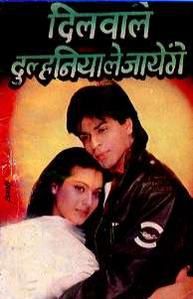
Like many of you, I have noticed this film has broken the record of length (600 weeks) in that cinema hall in Mumbai (link), and I had already been alerted some time ago by its 500 weeks’ record, so I too felt the urge to give my point of view. What’s its secret? Looking through the reviews and appreciations, I came across someone who said this:
"There is something in this film that always touches my heart. I don't know what it is. The dialogues, the acting and the songs are all very touching." (link)
Touching, quite right. But no more than other films of the same vein, I thought. Somebody else pointed to the very good combination of qualities it displays: the actors’ chemistry, the witty dialogues, the galloping rhythm, the great selection of songs: all true, too. The guy whose name is on the Wikidpedia page for Dilwale Dulhania Le Jayenge, Charles Taylor, underlined its special appeal for NRIs, and naturally even “RIs” would like a movie that stresses the need for traditions and roots in a fast-changing world. Many critics say that the originality of the story lies in the fact that the young girl is not snatched away from her family, as in many similar romances, but her lover is made to take her only with her father’s blessing, no matter the risks. This foreign-bred Hindustani thus puts to shame the native guys, proving that you can live far from home, but still uphold the essential home values.


I wonder whether Adi Chopra hasn’t earned some of his success by instilling in his film a subtle mixture of machismo and reform, but made them pass as respect for the power of love on the one hand, and for Indian family traditions on the other. I’m not struck so much by the fact that Raj the happy prankster is rude and lazy, that he is the “spoilt brat” that critics describe him, but that he imposes all this on Simran under the cover of modernising her principles and preconceptions about men.

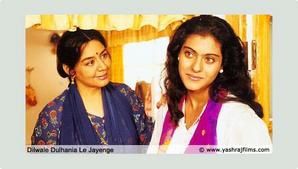
Now who’s Simran? An inexperienced Indian girl, raised in a “traditional” family (not so traditional I’d say, when we take into account her mother and their relationship), she’s full of very ordinary sapnõ, but she’s also a fascinating clown, that’s where her charm lies. Pity Raj hasn’t been able to spot that from the start! Well, there would have been no story then. She was probably phantasising an appreciative and delicate partner, serious-minded about family and children… What M. Chopra is saying is that she’ll have to broaden her mind! For him, she’s too much the well-brought up female who’s learnt to despise silly brats who think they’re the centre of the world, and hopes to ward them off with the right dose of ridiculing and contempt. In short, she’ll have to learn to sacrifice her ideal Prince to a not so ideal ordinary guy. What else will she be asked to sacrifice? Her principles, her strict values of right and wrong, and her self-assurance. She even decides to sacrifice her happiness at one stage, and even if this is done to enhance the spectator’s feeling of relief when she does earn the happiness that all girls get in such romances, I somehow think she’s being sacrificed (and Indian women in the bargain) to some degree of manipulation by our dear Adi. Well, this operation is complex. On the one hand, he’s trying to tell us that Indian women have to evolve. True, they have to; all this kow-towing to men’s rule must evolve. His method: have women accept they aren’t the shrines of virtue and purity that an age-old culture has decreed they are, because the result is that some women at least still believe that, and this maintains male supremacy.

But on the other hand, this necessary operation is done at the expense of a certain amount of femininity: Simran is the one who more than often has to adapt, to acknowledge she was wrong, ridiculous, and the story in this serious process tends to overlook her aspirations, her comic character, which is as much her as the shrew she is made to represent, and that Raj has the job to tame. Raj is not that “badmash”, conceded. He does sometimes acknowledge that his tricks have gone too far, he does say sorry when absolutely necessary, and he has indeed this sense of duty (some critics want to call it honour) which brings him the forgiveness of a charmed audience. But he doesn’t need to adapt, fundamentally, he’s all right. That’s what Aditya Chopra tells us. Here’s Raj's technique: shock first, and then obtain the forgiveness which everyone (including ourselves) is only too willing to give him. He’s still young, and so charming, isn’t he? Oh, he is serious about one thing: love. That’s what he declares at least.
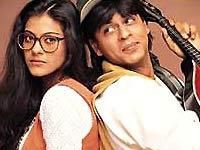
Because in DDLJ, as in so many other BW movies (and love-stories in general), love is said to be “pagal”, “diwana”, i.e. crazy. The only thing lovers are serious about is something they recognise as crazy. This is a very common romantic notion, but I wonder again whether it has not been slightly twisted here. I wonder if for Aditya Chopra, the message isn’t this one: women have to understand men’s attitudes towards them: men don’t love women the way women would intuitively like to be loved. Now DDLJ is a man’s film, so this position (if it’s true) is rather machistic, isn’t it? I would certainly go along with the fact that women in some types of cultures (the Indian one among them, probably) have been led to think and live according to a series of values imposed on them by a male-dominated rule, and they have found certain correspondences between this elevated position and their own need for protection and comfort. So it’s good (says the Adi doctrine) to break some of this rule to give back to women a little of the freedom they lost in the process. But if this done at the expense of feminine values (I’m thinking about a certain type of serious-mindedness) and without women themselves intervening, one might question the purity of the intentions. So love is serious, OK, but women love too, and their type of love doesn’t necessarily correspond to the one men would like them to have for them.
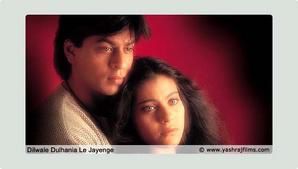
Simran does truly love Raj, there’s no questioning that. He may be a prankster, a liar, but she has felt he was fun, and that he matches her need for fun and the breaking of (some) rules. That’s Raj’s victory: he’s managed to make her understand that it’s going to be good to live with him, that this crazy love is the real love that makes life worth living and makes one enjoy it afresh. This folly indeed is very serious, since it is at the basis of society. Yet I still believe that Aditya Chopra has partly passed Raj’s fooling as this necessary folly of love, whereas in fact they are two distinct things, and womanly serious-mindedness gets jolted in the process. (Well, let’s be honest, it perhaps doesn’t suffer too much from the jolt!)
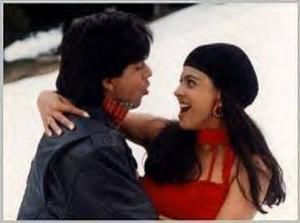
/image%2F1489169%2F20200220%2Fob_9722d6_banner-11.JPG)